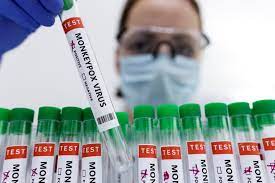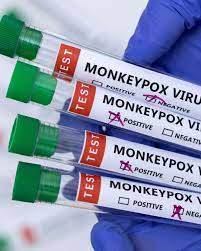Monkeypox infections typically begin with flu-like symptoms and progress to a painful rash. This rash is usually localized to genital, perianal or oral mucosa, but can spread throughout the body. Monkeypox – New Public Health Concern?
Stay informed with NYSDOH’s dedicated website, which updates regularly, and check your vaccine eligibility with your healthcare provider.

Symptoms
The rash often spreads to the hands, feet, chest, arms or legs, and it may cause painful bumps. The rash eventually scabs and clears. People can still be contagious while they have a rash, so it’s important to avoid contact with other people.
Monkeypox is a zoonotic disease, meaning it spreads from animals to people. It can be spread by skin-to-skin contact, respiratory droplets (cuddles, kissing), or contact with sores and scabs from a rash. It can also be spread by eating uncooked contaminated meat or animal products. This includes avoiding unprotected physical contact with wildlife or pets and taking care of children.
Transmission
Monkeypox spreads among people through close contact with an infected person’s rash, bodily fluids and/or respiratory droplets. It is not clear if the virus can be spread through sexual activity. In addition, some asymptomatic people who test positive for monkeypox may be “shedding” the virus and thus can infect others.
CDC is investigating household contacts of suspected and confirmed cases for signs of transmission. Households with evidence of multiple transmission events are called “clusters.” To date, CDC has identified 42 clusters in the Bokungu Health Zone. The following diagram shows a reconstruction of the potential transmission chain in one of these clusters.
Prevention
This includes raves, some festivals and other gatherings.
Anyone who has close, personal contact with someone who has a rash that looks like monkeypox is at risk. That includes multiple and anonymous sex partners, although most current cases are among men who have sex with men.
People can avoid the most serious complications — such as blindness — by getting early treatment. Penn Medicine has a limited supply of the Jynneos vaccine available for those at high risk for developing this virus. We will work with local health departments to identify eligible patients.
Treatment
The CDC recommends the use of an antiviral drug called tecovirimat, which is also being used to treat smallpox. It is well-tolerated and available as an oral tablet or IV solution.
Anyone who has had close contact with someone who has monkeypox should monitor their health for three weeks after exposure. They should stay home, avoid public gatherings and not donate blood, cells, tissue, semen or organs during this time needs read more hear……




















